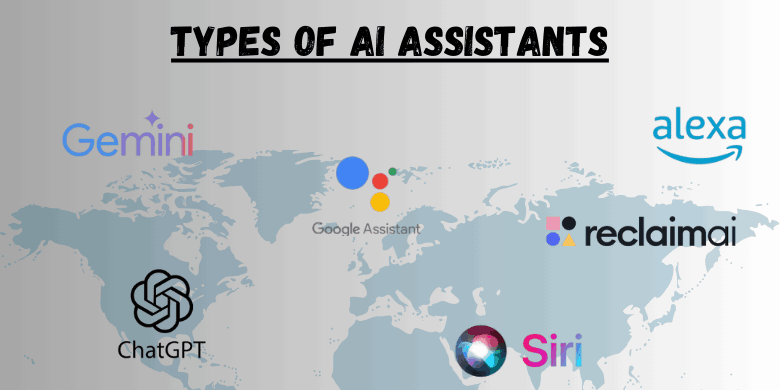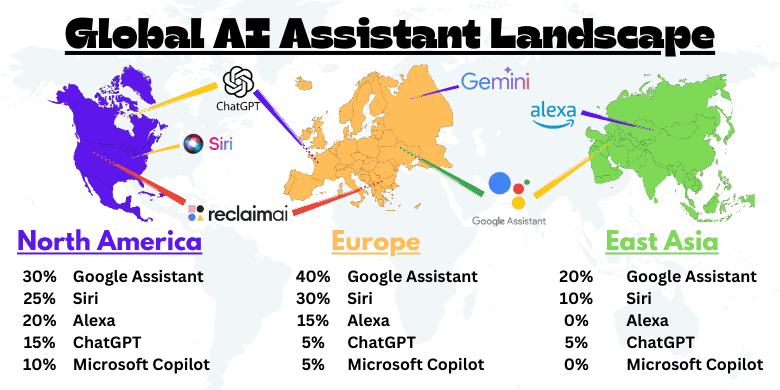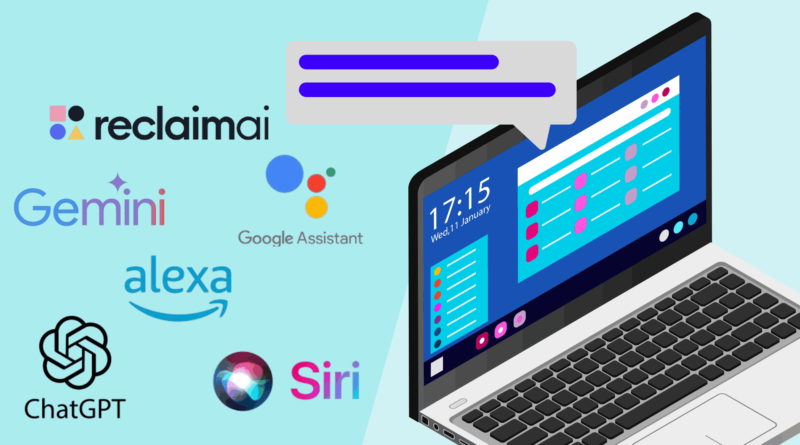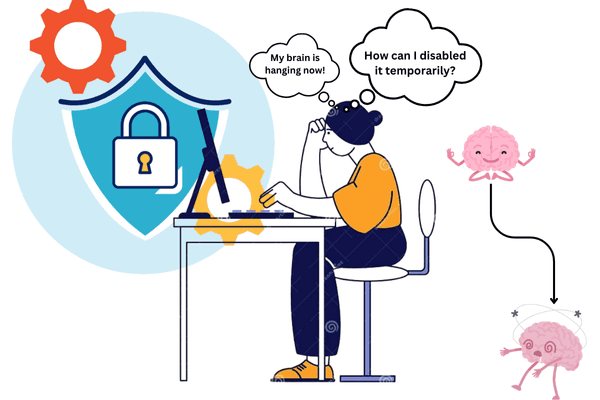Top AI Assistants For Small Business Tasks Automation
AI Assistants: Your Digital Sidekicks
Have you forgotten the sci-fi movies where characters had personal robots to do everything for them? We’re not exactly there yet, but we’re getting close with the rise of AI assistants. But these digital helpers are transforming our lives and our work.
What are AI Assistants?
Imagine that they’re like your personal tech assistants. These programs are software programs that can understand and reply to voice or text. Everything from setting reminders to playing music, answering questions even controlling your smart home devices.
How Do They Work?
Artificial intelligence (AI) and natural language processing (NLP) are combined to make AI assistants. NLP allows them to understand what you’re saying, while AI helps them to learn and get better at their jobs over time. Also having the power to identify the problems you have faced, such as data analysis, cybersecurity issues. It’s like having a really smart friend who’s always ready to help.
Types of AI Assistants

There are a few different kinds of AI assistants:
General-purpose assistants: We’ve got the most common ones, such as Siri, Google Assistant, and Alexa. They can do a lot.
Specialized assistants: Some of them are created to help you manage your finances or learn a new language.
Personal assistants: More tailored to your individual needs and preferences.
Best AI Assistants
| AI Assistant | Overview | Best For | Features | Pros and Cons |
|---|---|---|---|---|
|
ChatGPT by OpenAI |
A conversational AI assistant for writing, coding, customer support, and information retrieval. | Content creation, research, coding assistance. | Human-like responses, writing articles, debugging code, customizable modes. | Pros: High-quality language processing, easy API integration. Cons: Limited knowledge on events beyond 2023. |
|
Google Assistant |
Popular voice-activated assistant integrated into Google’s ecosystem. | Personal task management, smart home control. | Voice commands, integrates with Google services, controls smart home devices. | Pros: Excellent voice recognition, strong Google integration. Cons: Data privacy concerns. |
|
Amazon Alexa |
AI assistant for smart home automation, information retrieval, and entertainment. | Smart home automation, entertainment. | Controls smart devices, supports third-party skills, plays music, and sets alarms. | Pros: Extensive smart home compatibility, continuously updated. Cons: Limited conversational capabilities. |
|
Microsoft Copilot |
Integrated AI assistant for Office apps like Word, Excel, and Outlook. | Office tasks, data analysis, document creation. | Automates tasks in Office apps, data insights in Excel, email drafting in Outlook. | Pros: Deep integration with Microsoft Office, saves time. Cons: Requires a Microsoft 365 subscription. |
|
Siri by Apple |
Voice-activated assistant on Apple devices for everyday tasks and smart home control. | iOS/macOS users, everyday tasks. | Sends messages, places calls, controls HomeKit devices, hands-free navigation. | Pros: Tight integration with Apple’s ecosystem, privacy-focused. Cons: Handles complex queries less effectively. |
|
Cortana |
Enterprise-focused AI assistant for productivity within Microsoft 365. | Enterprise users in the Microsoft ecosystem. | Meeting setup, reminders, voice-based assistance, integrates with Teams. | Pros: Strong focus on business tools, works seamlessly with Windows. Cons: No longer a general-purpose AI assistant. |
|
Replika |
AI chatbot for mental health support and companionship. | Emotional support, companionship. | Empathetic responses, customizable conversation style, journaling tool. | Pros: Great for mental health support, meaningful conversations. Cons: Not suitable for task automation or business use. |
|
x.ai |
AI assistant specializing in meeting scheduling and calendar management. | Professionals needing scheduling automation. | Automates meeting setup, resolves calendar conflicts, integrates with Google Calendar and Outlook. | Pros: Saves time, integrates with calendar tools. Cons: Limited to scheduling tasks. |
AI Assistant Usage by Country and Region

AI assistant usage varies by country and region based on factors like language, cultural preferences, local regulations, and platform availability. Here’s an overview of which AI assistants are commonly used in various regions:
1. North America (United States and Canada)
- Dominant AI Assistants: Siri, Google Assistant, Alexa, ChatGPT, Microsoft Copilot
- Usage Trends:
- Siri is popular among iPhone users, while Google Assistant is widely used on Android devices.
- Amazon Alexa is a major player in smart home devices, especially with smart speakers like the Echo.
- ChatGPT and Microsoft Copilot are gaining traction in business and productivity tools.
- Voice-activated assistants are commonly used for tasks like setting reminders, controlling smart devices, and online shopping.
2. Europe
- Dominant AI Assistants: Google Assistant, Siri, Alexa, Microsoft Copilot
- Usage Trends:
- Google Assistant is widespread across Android devices, while Siri has a strong presence among Apple users in countries like the UK, Germany, and France.
- Alexa is popular in smart home ecosystems, particularly in the UK and Germany.
- Microsoft Copilot is used in workplaces, especially where Office 365 is already integrated.
- Voice assistants are often used for controlling smart home appliances, language translation, and travel-related queries.
3. East Asia (China, Japan, South Korea)
- Dominant AI Assistants: Baidu DuerOS, Xiaomi XiaoAI, Naver Clova, Siri, Google Assistant
- Usage Trends:
- In China, local AI assistants like Baidu DuerOS and Xiaomi XiaoAI are more popular due to language and regional preferences. Global players like Siri and Google Assistant face limitations because of regulatory restrictions.
- In Japan, Naver Clova (developed by the South Korean internet company Naver) is widely used, along with Siri and Google Assistant.
- Siri has a presence in South Korea, but Naver Clova is also popular.
- These assistants are used for entertainment, navigation, messaging, and smart home integration.
4. South Asia (India, Pakistan, Bangladesh)
- Dominant AI Assistants: Google Assistant, Siri, Alexa
- Usage Trends:
- Google Assistant dominates the market due to the high prevalence of Android devices. Its support for multiple regional languages and dialects makes it accessible.
- Siri is used by iPhone users, particularly in urban areas.
- Amazon Alexa has seen growth, especially for smart home control and voice-activated tasks.
- Voice assistants are often used for entertainment, language translation, and quick information searches.
5. Middle East
- Dominant AI Assistants: Google Assistant, Siri, Alexa
- Usage Trends:
- Google Assistant is common due to the high use of Android smartphones.
- Siri is popular among iPhone users, especially in Gulf countries like the UAE and Saudi Arabia.
- Amazon Alexa has a growing presence for smart home use.
- There is increasing demand for assistants that support Arabic language capabilities, which Google and Apple are continually enhancing.
6. Latin America
- Dominant AI Assistants: Google Assistant, Siri, Alexa
- Usage Trends:
- Google Assistant leads in usage due to the prevalence of Android devices.
- Siri is popular among the iOS user base.
- Alexa is used for smart home management but is less common than in North America.
- Voice assistants are often used for translation, music, and social media integration.
7. Africa
- Dominant AI Assistants: Google Assistant, Siri
- Usage Trends:
- Google Assistant is the most widely used AI assistant due to the dominance of Android smartphones.
- Siri is used among iPhone owners, primarily in urban and affluent areas.
- AI assistants are utilized for internet searches, language translation, and basic smart device control.
- There is a growing interest in incorporating local languages, but support remains limited.
8. Australia and New Zealand
- Dominant AI Assistants: Google Assistant, Siri, Alexa
- Usage Trends:
- Google Assistant is widely used due to the high number of Android users.
- Siri is popular among Apple product owners.
- Alexa is used for smart home controls, though it is not as prevalent as in the U.S.
- Voice assistants are frequently used for navigation, weather updates, and smart home tasks.
9. Russia and Eastern Europe
- Dominant AI Assistants: Yandex Alice, Google Assistant, Siri
- Usage Trends:
- Yandex Alice, developed by Russia’s search engine Yandex, is the preferred choice because of its local language capabilities and integration with Yandex services.
- Google Assistant is used on Android devices, while Siri is common among iOS users.
- Voice assistants are employed for tasks such as local navigation, online searches, and communication.
The use of AI assistants is growing globally, with different regions having unique preferences shaped by language support, platform dominance, and local tech ecosystems.
Benefits of AI Assistants
Increased productivity: AI assistants can help you with task automation so that you can spend your time on more important things.
Improved accessibility: People with disabilities have more access to technology.
Enhanced customer experience: Such AI assistants can be used by businesses so that Customer service can be improved.
Cost savings: Helping businesses save money using AI assistants is the automation of tasks that otherwise require human labor.
Challenges and Limitations
Privacy concerns: One issue with AI access on the go is privacy; AI assistants collect a lot of personal data.
Technical challenges: Building and managing AI assistants can be hard and costly.
Limited understanding: Even AI assistants might not yet fully grasp sophisticated language or environment.
The Future of AI Assistants
The future of AI assistants is promising. But as the technology gets increasingly sophisticated, we can expect more sophisticated and capable assistants. However, they may be able to control more devices, may know a little bit more about us, or even have a sense of humor.
Conclusion
However, the potential that these assistants could soon revolutionize the way we interact with technology is still in the early stages of development. The more advanced they get the more benefits and applications we will see. That is why, get ready to know your new digital sidekick!




